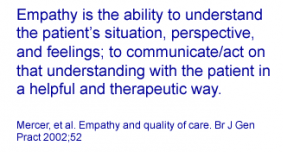April 30th, 2011 by StevenWilkinsMPH in Health Policy, Opinion
2 Comments »

Ok…here’s a brain teaser. What medical condition is the most costly to employers? I’ll give you a hint. It is also a medical condition that is likely to go unrecognized and undiagnosed by primary care physicians.
If you guessed depression you are correct. If you mentioned obesity you get a gold star since that comes in right behind depression for both criteria…at least in terms of cost and the undiagnosed part.
Four out of every ten people at work or sitting in the doctor’s waiting room suffer from moderate to severe depression. Prevalence rates for depression are highest among women and older patients with chronic conditions. Yet despite its high prevalence and costly nature, depression is significantly under-diagnosed (<50%) and under-treated by physicians.

For employers, the cost of depression cost far exceeds the direct costs associated with its diagnosis and treatment As the graphic above indicates, the cost of lost productivity for on the job depressed workers (Presenteeism) and lost time for depressed workers that are absent from the job (Absenteeism) far exceed the cost of cost of treatment (medical and medication cost).
Read more »
*This blog post was originally published at Mind The Gap*
March 16th, 2011 by StevenWilkinsMPH in Opinion, Research
3 Comments »

 Is anyone else tired of hearing about how important empathy is in the doctor-patient relationship? Every other day it seems a new study is talking about the therapeutic value of empathy. Enough already!
Is anyone else tired of hearing about how important empathy is in the doctor-patient relationship? Every other day it seems a new study is talking about the therapeutic value of empathy. Enough already!
It’s not that I don’t believe that empathy is important — I do. I also believe the data that links physician empathy with improved patient outcomes, increased satisfaction, and better patient experiences.
A recent study released in Academic Medicine reported that “patients of physicians with high empathy scores were significantly more likely to have good control over their blood sugar as well as cholesterol, while the inverse was true for patients of physicians with low scores.”
Findings from this study by Hojat, et al. are consistent with a 2009 study by Rakel, et al. which found that among patients with the common cold, those with physicians displaying high empathy had a significantly shorter duration of illness and trend toward lesser severity of illness and higher levels of immune response compared to those patients whose physician displayed less empathy. Read more »
*This blog post was originally published at Mind The Gap*
February 16th, 2011 by Elaine Schattner, M.D. in Better Health Network, Opinion
No Comments »

 Over the weekend I went to see “The King’s Speech.” So far the film, featuring Colin Firth as a soon-to-be-king-of-England with a speech impediment, and Geoffrey Rush as his ill-credentialed but trusted speech therapist, has earned top critics’ awards and 12 Oscar nominations. This is a movie that’s hard not to like for one reason or another, at least most of the way through. It uplifts, it draws on history, it depends on solid acting.
Over the weekend I went to see “The King’s Speech.” So far the film, featuring Colin Firth as a soon-to-be-king-of-England with a speech impediment, and Geoffrey Rush as his ill-credentialed but trusted speech therapist, has earned top critics’ awards and 12 Oscar nominations. This is a movie that’s hard not to like for one reason or another, at least most of the way through. It uplifts, it draws on history, it depends on solid acting.
What I liked best, though, is the work’s rare depiction of a complex relationship between two imperfect, brave, and dedicated men. At some level, this is a movie about guys who communicate without fixating on cars, football (either kind), or women’s physical features. Great! (Dear Hollywood moguls: Can we have more like this, please?)
The film’s medical aspects are four, at least: The stuttering, the attitude of physicians toward smoking, a closeted sibling who had epilepsy and died at an early age (just mentioned in passing), and the king’s trusted practitioner’s lack of credentials.
At the start, Prince Albert (young King George VI) has a severe speech impediment. It’s said that he stutters, and on film Firth does so in an embarrassingly, seemingly extreme and compromising degree. He’s the second of George V’s sons, and might or might not succeed to the throne depending on events in history, his older brother’s behavior, and his capacity to serve the Empire at the brink of war. Being effective as the king of England in 1936, and especially at the start of war in 1939, entails speaking confidently.
Prince Albert’s been through the mill with doctors who’ve tried to help him talk. Some recommend he smoke cigarettes — these, they advise, would help him to relax because they’re good for the nerves, they say. One asks him to speak with a mouthful of marbles, on which this doctor watching the film worried he might choke. Eventually Albert’s wife, Elizabeth (Queen Mother to be), finds a speech therapist in London, Lionel Logue, who uses unorthodox approaches with, by rumor, exceptional results. Eventually Prince Albert — or “Bertie” as the therapist insists on calling him — trusts and accepts help from this peculiar Australian who, it turns out, developed his methods of assisting stutterers through his work with shell-shocked soldiers in WWI. Read more »
*This blog post was originally published at Medical Lessons*
February 13th, 2011 by Bryan Vartabedian, M.D. in Opinion, True Stories
No Comments »

 It was sometime in the mid-nineties that parents started showing up in my office with reams of paper. Inkjet printouts of independently unearthed information pulled from AltaVista and Excite. Google didn’t exist. In the earliest days of the Web, information was occasionally leveraged by families as a type of newfound control.
It was sometime in the mid-nineties that parents started showing up in my office with reams of paper. Inkjet printouts of independently unearthed information pulled from AltaVista and Excite. Google didn’t exist. In the earliest days of the Web, information was occasionally leveraged by families as a type of newfound control.
A young father and his inkjet printer
One case sticks clearly in my mind. It was that of a toddler with medically unresponsive acid reflux and chronic lung disease. After following the child for some time, the discussion with the family finally moved to the option of a fundoplication (anti-reflux surgery). On a follow-up visit the father had done his diligence and appeared in the office with a banker box brimming with printed information. He had done his homework and his volume of paper was a credible show of force.
At the time in Houston, the Nissen and Thal fundoplication were the accepted fundoplication procedures in children. Deep from the bottom of one of the boxes, the father produced a freshly-reported method of fundoplication from Germany. He had compared the potential complications with other types of fundoplication and this was the procedure he wanted.
What he didn’t understand was that an experimental technique used on a limited numbers of adults didn’t necessarily represent the best option for his toddler. I gave it everything I had but didn’t get very far. The tenor of his argument was slightly antagonistic. Ultimately there was nothing more I could do. I deferred the remainder of the discussion to one of our best “talking” surgeons, but knew the father wouldn’t get the time and consideration that I had offered.
I never saw the child again. As they say, the father voted with his feet. Read more »
*This blog post was originally published at 33 Charts*
February 10th, 2011 by RyanDuBosar in Health Tips, Research
2 Comments »

 Physicians said in a survey that noncompliance with advice or treatment recommendations was their foremost complaint about their patients. Most said it affected their ability to provide optimal care and more 37 percent said it did so “a lot.”
Physicians said in a survey that noncompliance with advice or treatment recommendations was their foremost complaint about their patients. Most said it affected their ability to provide optimal care and more 37 percent said it did so “a lot.”
Three-quarters of patients said they were highly satisfied with their doctors. But they still had complaints ranging from long wait times to ineffective treatments.
Those are just some of the findings from two surveys, the first a poll of 660 primary care physicians conducted by the Consumer Reports National Research Center in September 2010 and the second a poll of 49,000 Consumer Reports subscribers in 2009. The magazine reported its results online.
In the doctors’ poll, physicians named these top challenges:
— 76 percent of doctors said when it came to getting better medical care, forming a long-term relationship with a primary care physician would help “very much.”
— 61 percent said being respectful and courteous toward doctors would help “very much,” while 70 percent said respect and appreciation from patients had gotten “a little” or “much” worse since they had started practicing medicine. This was a two-way street, since patients reported the same feelings.
— 42 percent physicians said health plan rules and regulations interfered “a lot” with the care they provided.
Also noted in the poll, 37 percent of physicians thought they were “very” effective when it comes to minimizing pain and discomfort for their patients, though 97 percent thought they were “somewhat” effective. But, 79 percent of patients said their doctor helped to minimize their pain or discomfort, according to the Consumer Reports blog. The gap might be explained by doctors thinking of their overall effectiveness with all of their patients, including those with chronic pain conditions that are difficult to diagnose and treat, and who are as a group less satisfied with their physicians. Read more »
*This blog post was originally published at ACP Internist*




















